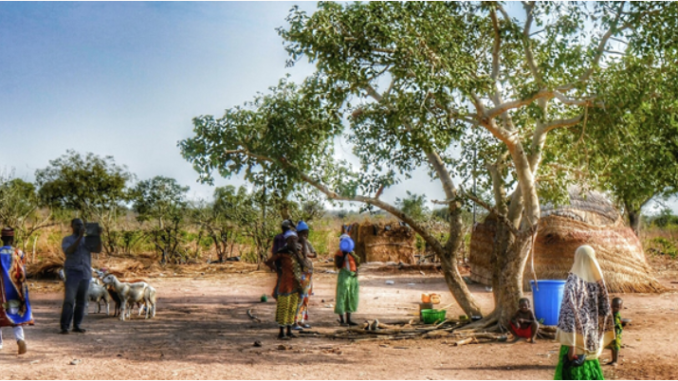
In no other facet of life is Nigeria’s underwhelming development as stark as in the rural areas. The poverty there is extreme; social infrastructure is non-existent. In the midst of the vacuous electioneering babble, a former top public servant, Ngozi Okonjo-Iweala, has pricked the conscience about this inattentiveness. During an event in Abia State, she urged governments to develop rural communities. As a former two-time Minister of Finance, her observation deserves a concerted action.
A former World Bank Managing Director, Okonjo-Iweala’s message to the three tiers of government is: without developing the rural areas, Nigeria itself will remain ensconced in grinding underdevelopment. This point is at the heart of the social dysfunction in the country. While noticeable development has occurred in the urban areas, the reverse is the case in the local communities. The backwardness there is acute.
Passable roads are rare; the absence of potable water, schools and primary healthcare is telling. Agriculture, the lifeblood there, is draining out because it is still at the subsistence level. The result is extreme poverty among the rural dwellers, which multilateral agencies estimate at 86.9 million of Nigeria’s 193 million population. This has provoked rural-urban migration, leading to congested cities and high rate of unemployment, which the National Bureau of Statistics says is at 55.4 per cent among those aged 15-34 years.
Farming, which is supposed to sustain the livelihood of these folks, is hallmarked by post-harvest losses. Crops rot away as farmers cannot get them to the market because of bad roads. The loss is debilitating, entrenching poverty. “Some food products never get to leave the farm before they experience spoilage, damage or waste while others happen during transport, storage and in the markets,” the Federal Institute of Industrial Research, Oshodi, laments. FIIRO puts the annual post-harvest losses at 50 per cent or $9 billion. The entire country is the worse for it.
Unfortunately, all tiers of government – federal, state and local – are guilty. Public officials swim in opulence at the expense of developmental projects. Worse, there is no organic structure to upgrade social infrastructure at both the urban and rural areas despite all the years of economic buoyancy from oil revenues. Rural electrification and water projects have failed. All that the poor get are promises.
A 2017 report by the Food and Agricultural Organisation – “The State of Food and Agriculture” – states that there are “vast potential for economic growth pegged to food production and related sectors” in the rural areas. The Rome-based organisation argues that if governments in developing countries can invest in rural upgrades, millions of people who are searching for opportunities in urban areas will be lifted out of poverty without necessarily migrating.
Apart from Ghana developing its rural communities under Jerry Rawlings, integrated rural development is given priority in China, India, Brazil and in other countries. In the five years to 2018, the Jiangxi Province of China spent $6.2 billion to build rural roads, aimed at reducing travel time, taking its people out of poverty and improving agricultural production. It plans to add 12,000 more kilometres in the next three years. In total, China built 1.28 million kilometres of rural roads in the five years to 2018, according to the National Strategic Plan for Rural Vitalisation (China).
Under a similar programme being undertaken by the National Social Assistance Programme of India’s national and state governments, basic infrastructure, including 82 per cent of all-weather roads in 47,000 rural habitations, would be constructed between December 2017 and March 2019. It is part of a 12-pronged rural-based scheme to provide access to loans and 100-day employment for the rural poor.
As the political gladiators mount the soapbox to campaign for votes in the forthcoming elections, it is paramount for the electorate to extract commitments from them about their rural development strategies. This undertaking is not rocket science. By reducing the humongous cost of governance, a capable governor or president should be able to invest the resources in rural development.
On this, every LG and state government should prioritise rural road construction, deploying new technologies that will make these routes durable. Rural inhabitants should have access to low interest credit. The Federal Government should collaborate with the states in these projects, providing counterparts or matching grants, just as it operates in the Universal Basic Education Fund. It should engage in rural electrification, which boosts the value-chain in agriculture.
In the 1980s, the Federal Government introduced the Directorate of Food, Roads and Rural Infrastructure to accelerate rural development. It has since become moribund. Therefore, it should improve on delivering transport in roads and the inland waterways to aid the movement of crops to urban markets. The Central Bank of Nigeria should deepen and implement more schemes like the Anchor Borrowers Programme and cooperatives among farmers.
Without adding value to the raw products, rural farmers will never reap the full benefits of their labour. So, simple equipment to process raw food, crops and agricultural extension services should be introduced to these rural communities.
Currently, Fulani herdsmen, kidnappers, bandits and Boko Haram insurgents are wreaking havoc on farming communities. As a result, there is a high rate of attrition in our rural communities. To put a stop to this, the security architecture should be comprehensively overhauled.
END

Be the first to comment